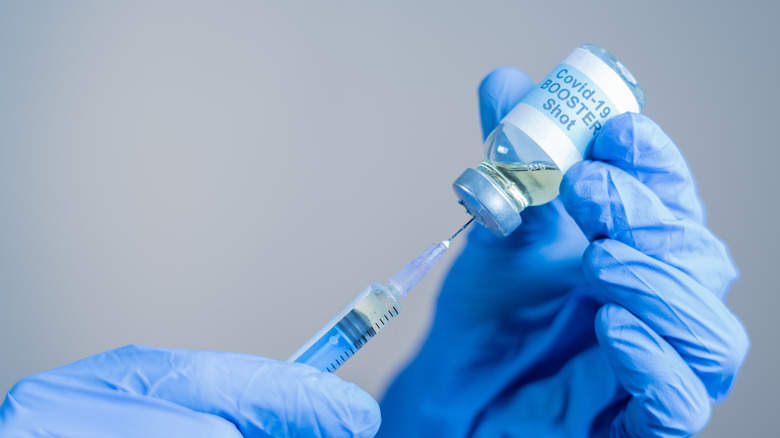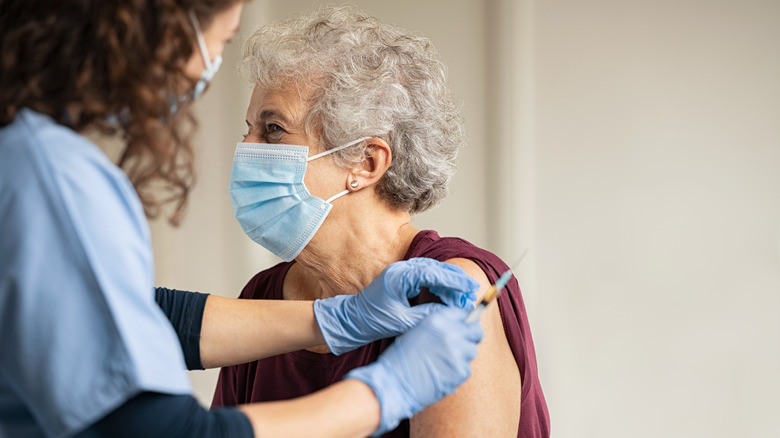Side Effects Of Moderna's COVID-19 Booster Shot Explained
In late October, the CDC expanded eligibility for Moderna's COVID-19 booster shot (via Centers for Disease Control and Prevention). Certain individuals became eligible to receive a booster shot six months after finishing their initial two doses. People who were eligible for a Moderna booster shot included those 65 years or older, and those who were 18 years or older and lived in long-term care settings, had underlying medical conditions, or worked or lived in high-risk settings.
Then, on November 19, the CDC further expanded the eligibility for both Pfizer and Moderna's booster shots. "After critical scientific evaluation, today's unanimous decision carefully considered the current state of the pandemic, the latest vaccine effectiveness data over time, and review of safety data from people who have already received a COVID-19 primary vaccine series and booster," CDC Director Rochelle P. Walensky revealed in a statement. "Based on the compelling evidence," she continued, "all adults over 18 should now have equitable access to a COVID-19 booster dose."
The side effects are similar to the second dose
According to AARP, Moderna's COVID-19 booster shot contains half the dose of the shot used in the primary series. Although the dose is smaller, the side effects seem to be similar to those seen after the second Moderna dose. Based on data taken by Moderna, the most common side effects of the booster shot include injection site pain, fatigue, headache, muscle pain, and joint pain. Chills, nausea, and vomiting have also been reported. Symptoms seem to be worse in recipients ages 18 to 64 and not as severe for those over the age of 65.
However, data from Israel's booster shot program indicate that symptoms are less severe overall after getting the booster shot than they were during the initial shots. Fewer side effects have been reported for both the Pfizer and Johnson & Johnson vaccines and experts expect the same data to follow with the Moderna booster shot.
Previous experience with the COVID-19 vaccine may help
Moderna's COVID-19 booster shot side effects may be less severe because the dose is smaller, but it may also be because people are more prepared for the experience. According to Robert Weber, administrator for pharmacy services at the Ohio State University Wexner Medical Center, people who are getting the booster shot know what to expect and how to prepare this time around. "I think people also understand how to manage the side effects better in terms of drinking plenty of water prior to getting a vaccine, drinking plenty of water after you get the vaccine, taking it easy the next day," he told AARP.
Being less nervous about receiving the COVID-19 booster may also prevent symptoms like anxiety, which can make other symptoms feel worse or more concerning. AARP also noted that health officials have said it is okay to get a booster shot from a different brand. If your symptoms were particularly uncomfortable from Moderna's first two doses, for example, you may be able to get a Pfizer booster shot instead.
Vaccine side effects are common
Although experiencing side effects from a vaccine can be nerve-wracking, mild to moderate symptoms are very common. According to the CDC, your body creates an immune response to the vaccine that will protect you in the future. If the disease you are being vaccinated against ever enters your body, your immune system will be prepared to fight it. Mild side effects, including injection site pain, fatigue, headache, muscle pain, and joint pain, are all extremely common. You shouldn't worry if you experience those effects after receiving Moderna's COVID-19 booster shot.
Some people are concerned about long-term side effects, but experts say these are rare. According to Women's Health, most side effects occur within a few days or weeks of receiving a vaccine or booster. "Thinking of all the vaccines we use in childhood and adulthood, I can't think of any long-term side effects," said Dr. William Schaffner, an infectious disease specialist and professor at the Vanderbilt University School of Medicine. "Vaccines don't have a bad effect that occurs eight months, a year or two, or longer." All vaccines and boosters, including the ones developed for COVID-19, go through a rigorous testing process through the FDA before they are authorized for public use.
Why are booster shots needed?
Regardless of how effective a vaccine is, its efficacy can wear off over time. This has been the case with the COVID-19 vaccines, as well as many other vaccines in our history. According to GoodRx, childhood vaccines like DTaP (diphtheria, tetanus, pertussis) require a booster shot after the protection from the initial shot decreases over time. The prevalence of new COVID-19 variants also affects the initial vaccine's efficacy. The antibodies we create after our first doses may not be as effective at fighting these variants, and a booster shot can make sure we are better protected.
So far, the Pfizer and Moderna vaccines have been highly effective against the various COVID-19 variants that have emerged. If you are eligible for a booster shot, getting one can significantly reduce your risk of developing COVID-19. Depending on how well the vaccines protect us in the long term, the COVID-19 vaccine may require a yearly booster shot like the flu (via GoodRx).
Getting vaccinated offers better protection than natural immunity
The Centers for Disease Control and Prevention released a study on October 29 that shows that vaccination against COVID-19 offers better protection against the virus than a previous infection. Previously, some had argued that the antibodies created during a COVID-19 infection were better equipped to fight an additional COVID-19 infection. The CDC's study, however, disputes this claim, stating that after observing 7,000 people across nine states who were hospitalized with COVID-19 symptoms, "those who were unvaccinated and had a recent infection were 5 times more likely to have COVID-19 than those who were recently fully vaccinated and did not have a prior infection."
These findings show that "vaccination can provide a higher, more robust, and more consistent level of immunity to protect people from hospitalization for COVID-19 than infection alone." If you have already been vaccinated, a COVID-19 booster shot can increase your level of protection.






